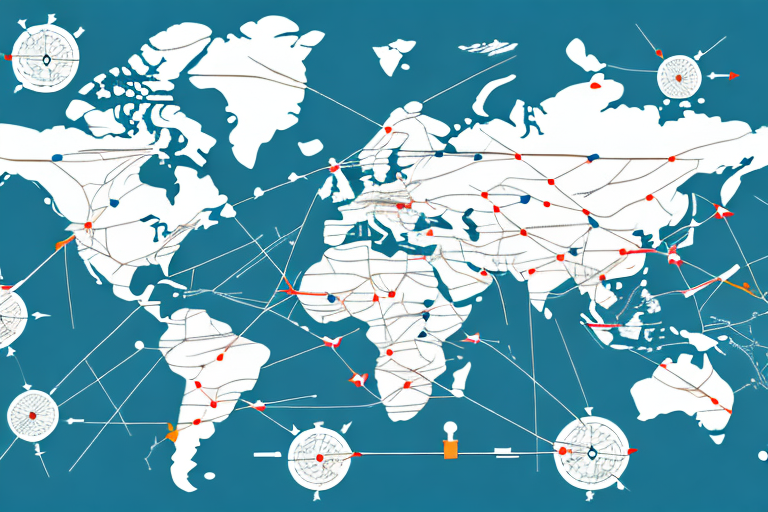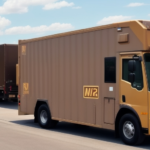Understanding UPS International Shipping Rates: 11 Things You Need to Know
If you're exploring international shipping options, UPS is one of the leading carriers available. Known for their reliable and timely delivery services across the globe, UPS is a preferred choice for numerous businesses and individuals. However, like any shipping company, UPS charges varying rates based on several factors. In this article, we'll provide you with everything you need to know about UPS international shipping rates, including detailed analyses and up-to-date information.
Why UPS is a Popular Choice for International Shipping
UPS provides exceptional international shipping services that include fast transit times, multiple shipping options, and secure tracking. Operating in over 220 countries and territories, UPS manages more than 2,500 daily international flights, delivering over 1.5 billion packages annually. They offer a vast range of shipping options, such as Worldwide Express, Worldwide Expedited, and Express Saver, among others.
One of the key reasons UPS is a popular choice for international shipping is their strong commitment to sustainability. In 2023, UPS continued to implement eco-friendly initiatives, such as utilizing alternative fuel vehicles, optimizing delivery routes through advanced logistics software, and investing in renewable energy sources. These efforts not only benefit the environment but also help reduce operational costs and improve overall efficiency. According to their sustainability report, UPS aims to achieve carbon neutrality by 2050.
Another advantage of using UPS for international shipping is their excellent customer service. They have a dedicated team of experts who assist with customs clearance, provide real-time updates on shipment status, and offer solutions to any issues that may arise. Additionally, UPS boasts a user-friendly website and mobile app, allowing customers to easily track and manage their shipments on the go. According to customer satisfaction surveys conducted in 2023, UPS maintains a high rating for its customer service in the logistics industry.
Factors That Affect UPS International Shipping Rates
Understanding UPS international shipping rates involves several key variables. These include:
- Package Weight and Dimensions: The heavier and larger your package, the higher the shipping cost. UPS calculates rates based on actual weight or dimensional weight, whichever is greater. In 2023, the dimensional weight formula used by UPS is (Length x Width x Height) / 139 for domestic shipments and may vary for international ones.
- Destination: Shipping to distant locations generally incurs higher costs due to increased transit time and resource allocation. Additionally, certain countries may have higher tariffs or taxes that affect the overall rate.
- Service Level: UPS offers various service levels, from expedited express services to more economical, slower options. Expedited services, which promise quicker delivery times, naturally come at a premium price.
- Type of Items Shipped: Hazardous materials, fragile items, and goods requiring special handling may attract additional fees or surcharges. Ensuring proper classification and labeling of your shipment is crucial to avoid unexpected costs or delays.
Furthermore, currency exchange rates and fuel surcharges can also influence the overall shipping rates, reflecting the dynamic nature of international shipping costs.
How to Calculate UPS International Shipping Rates
Calculating UPS international shipping rates is a straightforward process. To obtain an accurate estimate, you'll need the following details:
- Package Weight and Dimensions: Accurate measurements ensure precise rate calculations.
- Shipping Address: The destination country affects the overall cost.
- Service Level: Choosing between various UPS service options will influence the price.
Once you have this information, you can use the UPS Rate Calculator available on their official website. By inputting these details, the calculator will provide a quote for estimated shipping costs, along with different service level options to suit your budget and timeline.
It's important to note that UPS international shipping rates can vary based on the destination country's customs regulations and applicable taxes. Therefore, it's recommended to research and understand these additional costs before shipping internationally. Additionally, UPS provides various tools and resources to assist with international shipping, including customs documentation assistance and comprehensive international package tracking services.
Tips for Saving Money on UPS International Shipping Rates
- Use Lightweight Packaging: Opt for lighter packaging materials that don’t add unnecessary weight to your shipment. This can significantly reduce the overall shipping costs, as rates are influenced by package weight.
- Consolidate Shipments: Combining multiple shipments into a single larger shipment can lead to bulk discounts and lower shipping rates per package.
- Partner with a Forwarder or Third-Party Logistics Provider: Collaborating with a freight forwarder or 3PL can provide access to bulk discounts and more competitive rates, especially for frequent shippers.
- Leverage UPS Discounts and Promotions: Take advantage of discounts and promotions available through programs like UPS My Choice or by negotiating rates based on your shipping volume and loyalty.
- Accurate Shipment Declaration: Properly declare the value of your shipment and accurately describe its contents. This helps avoid unnecessary fees, surcharges, or delays due to customs inspections.
- Choose Economical Service Levels: Opt for slower shipping options, such as UPS Standard, instead of expedited services when speed is not a critical factor. This can result in lower shipping costs.
- Compare Rates with Other Shipping Carriers: Evaluate and compare shipping rates and services offered by other shipping carriers to ensure you're getting the best deal for your international shipments.
By implementing these strategies, you can effectively reduce your UPS international shipping costs without compromising on service quality.
Understanding Different UPS International Shipping Options
UPS offers a variety of international shipping options tailored to accommodate diverse shipping needs. The most popular shipping services include:
- UPS Worldwide Express: Provides next day delivery to over 220 countries and territories, making it ideal for urgent shipments.
- UPS Worldwide Expedited: Offers fast export service worldwide with delivery times typically within two to five business days.
- Express Saver: Delivers shipments within two to three business days, balancing speed and cost-effectiveness for less urgent deliveries.
Additionally, UPS offers UPS Standard, a cost-effective shipping option for packages that are not time-sensitive. This service provides reliable ground delivery to Canada and Mexico, with delivery times ranging from one to five business days depending on the destination.
For businesses requiring specialized shipping services, UPS provides UPS Worldwide Express Freight, a premium air freight service that ensures guaranteed door-to-door delivery for heavyweight shipments. This service includes customs clearance and real-time tracking, ensuring that your shipment arrives on time and in excellent condition.
How to Track Your UPS International Shipment
UPS provides a robust real-time tracking system that allows customers to monitor their packages' location and status throughout the shipping process. To track your international shipment, simply visit the UPS Tracking page and enter your tracking number, which is provided at the time of shipment. This will give you access to regular updates on your package's location, estimated delivery timeframe, and other essential details.
It's important to note that tracking information may not be available immediately after your package is shipped. Typically, it can take up to 24 hours for the tracking system to update with the latest information. If you're unable to track your package after this period, consider contacting UPS customer service for assistance.
In addition to basic tracking, UPS offers several premium tracking and security services, including:
- Delivery Confirmation: Provides proof of delivery, including the date, time, and recipient's signature.
- Signature Confirmation: Ensures that your package is handed directly to the intended recipient or an authorized agent.
- Insurance: Offers coverage against loss or damage during transit, providing peace of mind for valuable shipments.
These additional services can be selected when shipping your package or added later through the UPS website, enhancing the security and reliability of your international shipments.
Common UPS International Shipping Issues and How to Avoid Them
While UPS provides reliable international shipping services, there are several common challenges that customers may encounter. Being aware of these potential issues and knowing how to prevent them can ensure a smoother shipping experience:
- Customs Delays: Shipments can be delayed at customs due to incomplete or inaccurate documentation. To avoid this, ensure that all necessary customs forms are accurately filled out and that you comply with the destination country's import regulations. Refer to the UPS Customs Guidance for detailed information.
- Incorrect Addresses: An incorrect or incomplete address can lead to delivery failures or delays. Always double-check the recipient's address for accuracy, including postal codes and contact information.
- Damaged Packages: Inadequate packaging can result in damaged goods during transit. Use sturdy packaging materials and proper cushioning to protect your items. Consider purchasing UPS insurance for valuable or fragile shipments.
- Unexpected Fees and Charges: Additional costs such as customs duties, taxes, and brokerage fees can inflate your shipping expenses. To mitigate this, research the destination country's customs regulations and estimate potential fees in advance, incorporating them into your shipping budget.
- Transit Time Delays: Factors like adverse weather conditions, customs inspections, and logistical issues can extend transit times. To minimize delays, allow additional time for your shipments, especially when using standard or economy shipping options.
- Lost Shipments: Although rare, packages can sometimes be lost during transit. Utilizing UPS's tracking and insurance services can help locate lost packages or recoup losses in such events.
By adhering to best practices—such as ensuring accurate documentation, using robust packaging, and understanding the destination country's import requirements—you can effectively avoid common UPS international shipping issues. Additionally, proactive communication with UPS customer support can help resolve any problems that may arise promptly.
Comparing UPS International Shipping Rates with Other Carriers
While UPS is renowned for its reliability and efficiency, it's essential to compare shipping rates and services with other leading carriers to determine the best fit for your specific needs. Here are comparisons with some of UPS's main competitors:
- DHL: DHL is a popular choice for international shipping, particularly for shipments to Europe and Asia. They offer a range of services, including Express and Economy shipping. DHL is known for its strong global network and timely delivery, often preferred for urgent shipments.
- FedEx: FedEx offers a variety of international shipping options, including same-day delivery, overnight shipping, and international freight services. They provide comprehensive tracking tools and resources to help businesses manage their logistics efficiently.
- USPS: The United States Postal Service (USPS) is often a cost-effective option for smaller or less urgent international shipments. Services like Priority Mail International and Express Mail International offer reasonable delivery times at competitive rates, albeit with less comprehensive tracking compared to UPS or FedEx.
When comparing UPS to these carriers, consider the following factors:
- Cost: UPS may offer more competitive rates for certain weight classes or destinations, especially when leveraging bulk shipping discounts through services like UPS Negotiated Rates.
- Delivery Speed: For the fastest delivery times, UPS and FedEx typically outperform USPS, particularly for express services.
- Global Reach: DHL tends to have a more extensive presence in Europe and Asia, whereas USPS may have more limited coverage in certain remote regions.
- Tracking and Reliability: UPS and FedEx generally offer more detailed tracking and higher reliability for international shipments compared to USPS.
Ultimately, the best shipping carrier for your international needs depends on factors such as budget, delivery speed requirements, destination, and the nature of the items being shipped. It's advisable to evaluate and compare rates and services by using each carrier's rate calculator and considering any available discounts or partnerships you may have.
How to Prepare Your Shipment for UPS International Shipping
Preparing your shipment correctly is crucial for ensuring that your package arrives safely and without delays when using UPS for international shipping. Follow these steps to optimize your shipping process:
- Secure Packaging: Use sturdy materials such as corrugated boxes and reinforced tape to protect your items. Ensure that the box is in good condition with no tears or weakened points.
- Cushioning: Protect your items from damage by using adequate padding materials like bubble wrap, packing peanuts, or foam inserts. Secure all items within the box to prevent movement during transit.
- Accurate Labeling: Clearly label your package with all relevant details, including the recipient's full name, address, and contact information. Include a return address that is accurate and legible.
- Customs Documentation: Research and comply with the destination country's customs regulations. This may involve filling out specific customs forms and providing detailed descriptions of the items being shipped. Refer to the UPS Customs Documentation guidelines for assistance.
- Insurance: Consider purchasing insurance for valuable or fragile items to protect against potential loss or damage during transit. UPS offers various insurance options tailored to different shipping needs.
- Proper Label Placement: Ensure that labels are placed prominently and securely on the package. Avoid covering labels with tape or other materials, as this can interfere with scanning and tracking.
By meticulously preparing your shipment—using robust packaging, securing items properly, and ensuring all documentation is accurate—you can facilitate a smooth and successful international shipping experience with UPS. Additionally, leveraging UPS's packaging guidelines and resources can further enhance the safety and efficiency of your shipments.
Understanding Customs Requirements for UPS International Shipments
When engaging in UPS international shipping, compliance with customs regulations in both the shipping and receiving countries is paramount. Non-compliance can lead to shipment delays, additional costs, or even seizure of goods. Here’s how to navigate customs requirements effectively:
- Accurate Documentation: Ensure that all necessary customs forms are accurately completed. This includes the Commercial Invoice, Shipper's Export Declaration, and any other required documentation based on the destination country's regulations. Refer to the UPS Customs Guidance for detailed instructions.
- Proper Declared Value: Accurately declare the value of the items being shipped. Misdeclaration can result in fines or additional duties. UPS’s Declared Value for Carriage option provides coverage for loss or damage and is based on the declared value you assign to your shipment.
- Item Restrictions and Prohibitions: Different countries have varying import restrictions. Items such as certain foods, electronics, or hazardous materials may be restricted or prohibited. Research the destination country's import regulations to ensure your items are permissible. The International Shipping Restrictions page provides comprehensive information.
- High-Value Shipments: Shipments with high-value items may require additional documentation or security measures. Some countries require certificates of origin or specialized permits for valuable goods. Consult with UPS or a customs broker to ensure compliance.
- Tariffs and Taxes: Be aware of any import duties, taxes, or tariffs that may apply to your shipment. These fees vary by country and item type, and they can significantly impact the total shipping cost. Including these in your shipping plan helps avoid unexpected expenses for the recipient.
- Packaging Regulations: Some countries have specific packaging requirements, especially for certain types of goods. Ensuring compliance with these can prevent delays and ensure safe delivery.
By thoroughly researching and adhering to the customs requirements of the destination country, you can facilitate a smooth customs clearance process and avoid potential complications. Utilizing UPS’s extensive resources and consulting with customs experts can further enhance compliance and ensure the timely delivery of your international shipments.
How to Deal with Delays or Issues in UPS International Shipments
Despite UPS's commitment to timely deliveries, unforeseen circumstances such as extreme weather, customs inspections, or logistical challenges can sometimes cause delays. If you encounter any issues with your UPS international shipment, follow these steps to address them effectively:
- Contact UPS Customer Service: Reach out to UPS customer service immediately to inquire about the status of your shipment. They can provide real-time updates and assist in locating your package. Visit the UPS Contact page for various ways to get in touch.
- Utilize UPS Tracking Tools: Use the UPS tracking system to monitor your shipment's progress. If there's an unexplained delay, the tracking tool can offer insights into where your package is and what might be causing the holdup.
- Request a Refund or Compensation: If your shipment is significantly delayed or arrives damaged, you may be eligible for a refund or compensation. UPS offers a Claims process for both delays and damages.
- File a Claim: For lost or damaged items, promptly file a claim with UPS. Provide all necessary documentation, including tracking numbers, proof of value, and evidence of damage, to expedite the process.
- Stay Informed: Regularly check for any notifications or updates from UPS regarding your shipment. Being proactive can help you address issues before they escalate.
In summary, international shipping through UPS can be an efficient and effective way to send your packages worldwide. By understanding the key factors that affect UPS international shipping rates and being prepared to handle potential issues, you can optimize your shipping experience. Implementing the tips and strategies outlined in this guide will help you make informed decisions that cater to both your business and personal shipping needs.
Remember, selecting the appropriate UPS shipping option—be it express or standard—based on your specific timeline and budget can significantly impact the success of your shipments. Additionally, utilizing UPS's customs clearance services ensures compliance with all necessary regulations, further smoothing the international shipping process.
Proper packaging remains a fundamental aspect of successful international shipping. Always use sturdy boxes and high-quality packing materials, and clearly label your packages with the recipient's accurate address and contact information. These practices help prevent delays and ensure that your packages arrive safely and on time.






















